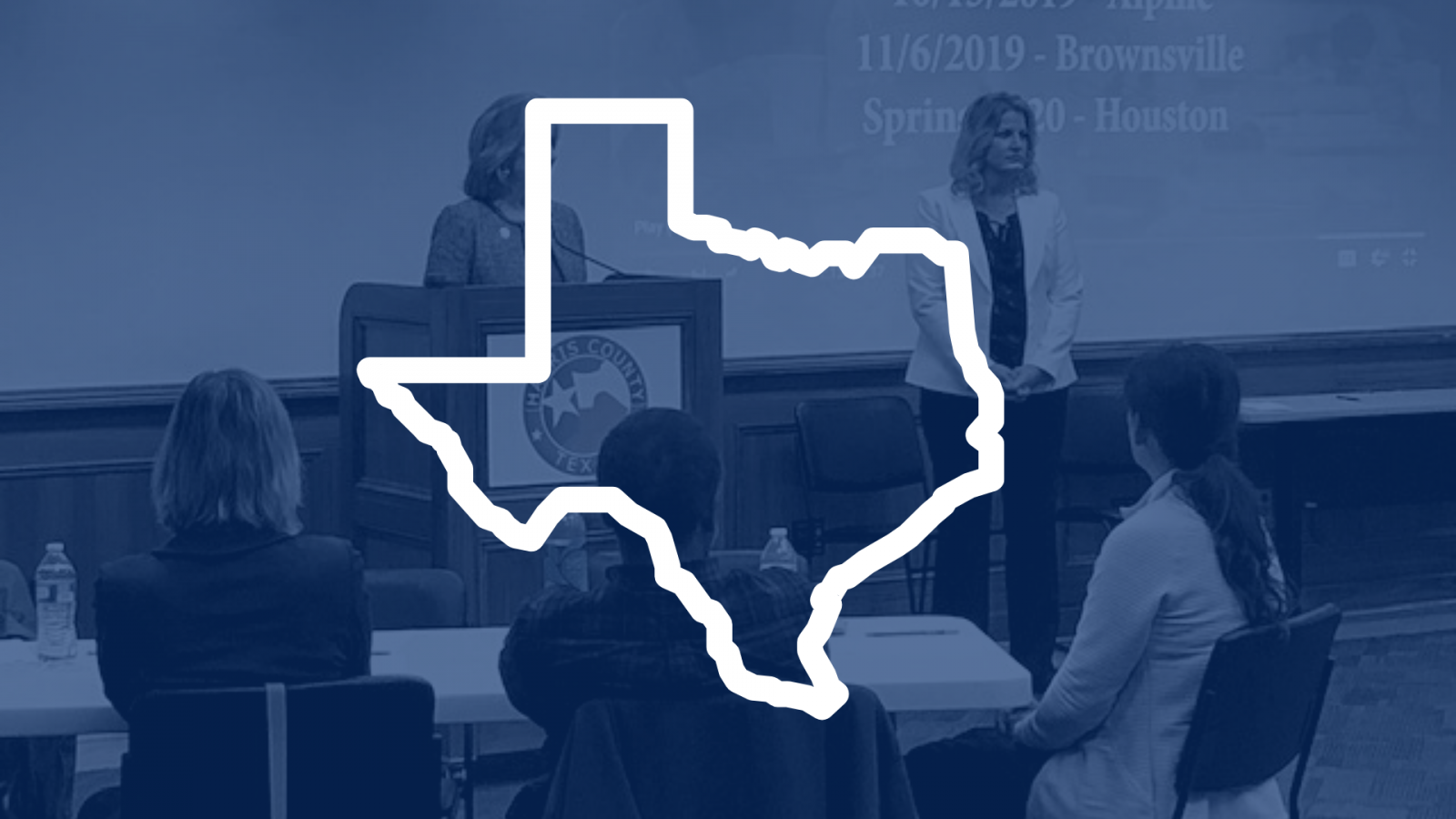
Texas' Approach to Community Engagement
The Texas Office of Court Administration (OCA) led and coordinated the Texas pilot projects, and convened engagement sessions in three communities across the state. Texas engaged and collaborated with judges, attorneys, and other professionals to inform their engagement project, and featured several of the judges in their engagement activities.
Goals
- Gather feedback and identify important themes from communities about perceptions of the courts and judicial system.
- Create resources and develop a toolkit for all courts across Texas.
- Recruit judges and court actors to grow public engagement and trust initiatives with communities.
Recruitment Overview
The Texas team used a purposive and convenience sampling approach to recruit participants to engagement sessions in three different communities: Alpine, Brownsville, and Houston. The Texas team worked with partners in the community and justice system to disseminate information about their engagement opportunities via community connectors, as well as through the media. The Texas team also created an online survey about court access to recruit interested members of the public, and approached and recruited court users and jury pool participants for the engagement events in Houston.
Engagement Overview and Activities
The Texas team convened a total of four public engagement sessions in Texas – one each in Alpine and Brownsville, and two sessions in Houston. Texas selected these communities based on population size, geography and demographic representation, with Alpine representing a small rural community, Brownsville being a mid-sized city, and Houston being a large urban metropolis. All engagements aimed to gather feedback about courts, the judicial system, issues of fairness and equal treatment, and assess public awareness of judicial system services and reforms.
The Texas team engaged court actors and stakeholders in planning for each community event, and involved judges directly in the engagement sessions. Small group break-out sessions allowed participants to discuss relevant issues in depth, and then report out themes in a large group setting. Each engagement session was approximately two and a half hours long, with slight variations for each community event.
Key Findings
- Participants discussed a general feeling of distrust of the courts and of judges that could be influenced by lack of knowledge of the judicial process and of the role of judges.
- Participants saw it as a personal responsibility to gain more knowledge of the court system.
- One group emphasized that judicial education should begin at the middle or high school level.
- One group discussed creating a community resource center that would serve as an intermediary role between the courts and the community.
- Participants felt that socioeconomic status was more of a factor than race in determining if a defendant would receive justice in the courts.
- Perceived corruption and cronyism in the local court system influenced participants’ views of fairness.
- Language access issues within the court system were viewed as a recurring problem.
- Participants emphasized a need for judge involvement in the community during non-campaigning periods to increase public trust.
- Participants encouraged using the school system to educate students and parents about the courts.
- Participants saw a need for more community resource centers and enhanced communication of available resources. Even though some community resource centers exist, not many people know about them due to the lack of outreach.
- Locations of court offices, specifically county and district offices, limited accessibility to county services.
- Participants expressed a desire for judicial education to increase understanding of court procedures, including pro se resources and legal clinic aid.
- Participants thought churches and religious centers could serve as conduits between the community and judicial officials to build trust.
- Participants’ opinions of the judicial system were influenced by their interactions with law enforcement.
Evaluation
The Texas team administered pre and post engagement surveys at all four community engagement sessions. A total of 66 individuals completed surveys, including members of the public, community stakeholders, and court actors. Notable results included:
Across all four engagement sessions, participants were asked (at pre and post) to rate how much they trusted the courts, how comfortable they would be letting the courts decide a case that was important to them, and their perceptions of the likelihood and degree of positive and negative effects of the courts on their community. On average (see blue line), there were positive changes from pre to post survey regarding trust in courts, comfort with letting courts decide cases important to respondents, and perceptions of the positive effects of courts in respondents’ communities. However, after the engagement sessions there were also increases in respondents’ beliefs that courts have negative effects in communities. In Brownsville, some participants shared concrete stories involving local officials whom other participants may have known personally. This may explain the observed pre-post decreases in comfort with the state courts expressed by Brownsville engagement participants.
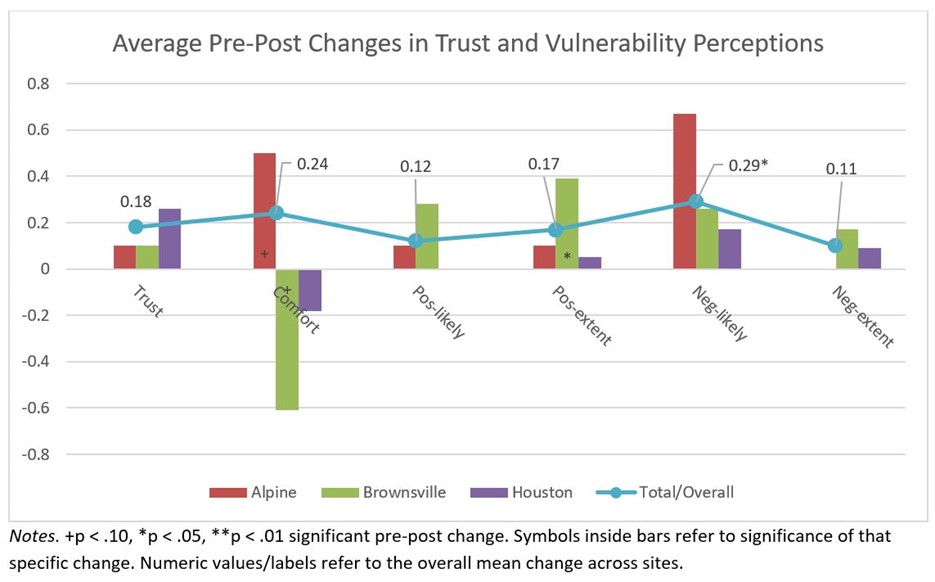
Among all four engagement sessions, the average rating for satisfaction with the engagement sessions was 4.6 on a scale of 1-5, in which 1 = very dissatisfied, 2 = dissatisfied, 3 = neither satisfied nor dissatisfied, 4 = satisfied, and 5 = very satisfied.
Thus, on average, participant satisfaction with the engagement experience was between satisfied and very satisfied.
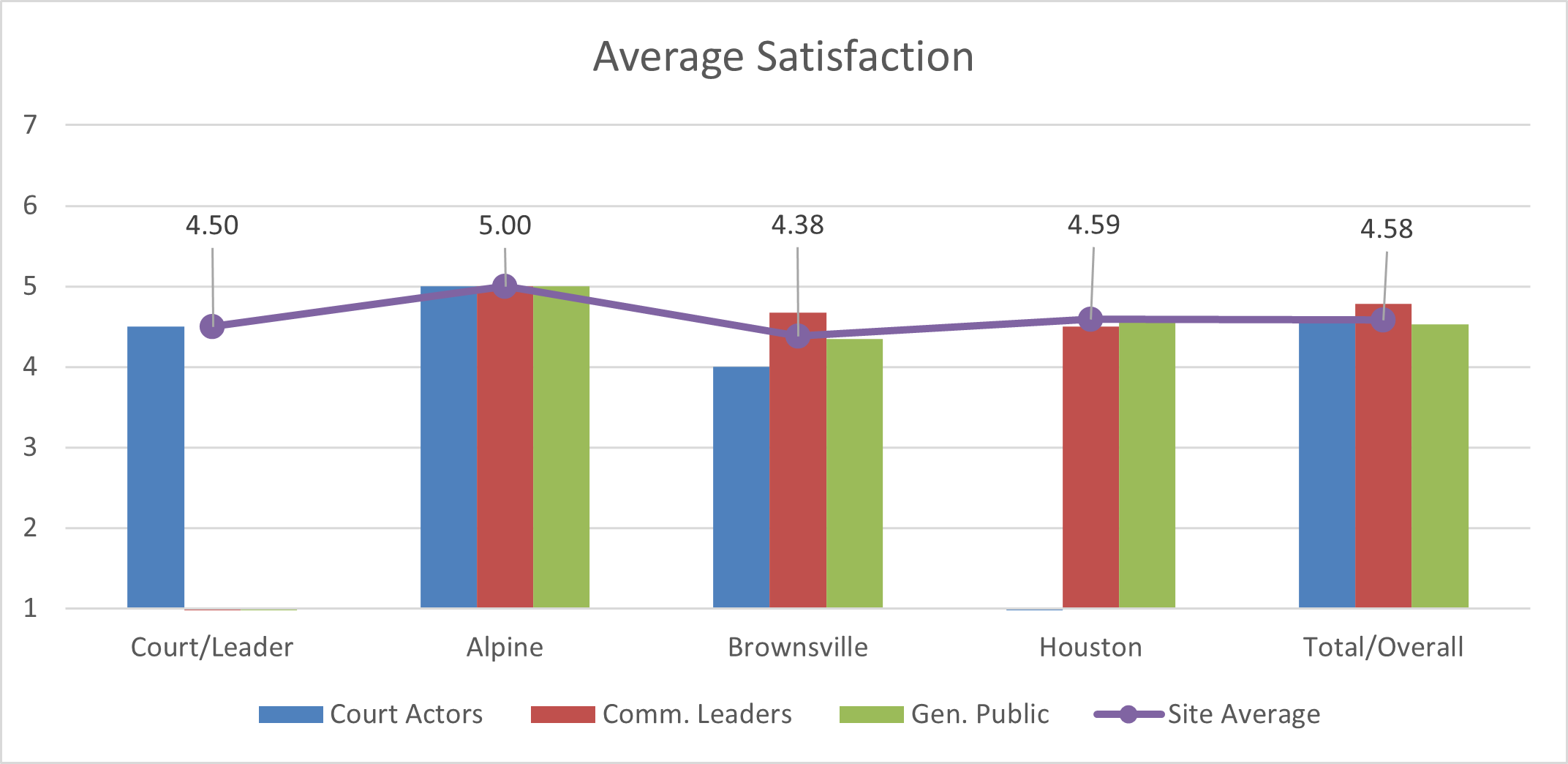
Among all four engagement sessions, the average rating for respondents’ perceptions of how much their knowledge of Texas courts increased was 3.6 on a scale of 1-5, in which 1 = not at all, it stayed the same, 2 = slightly increased, 3 = somewhat increased, 4 = increased quite a bit, and 5 = increased a great deal.
Thus, on average, survey respondents felt that their knowledge of Texas courts increased between somewhat or quite a bit.
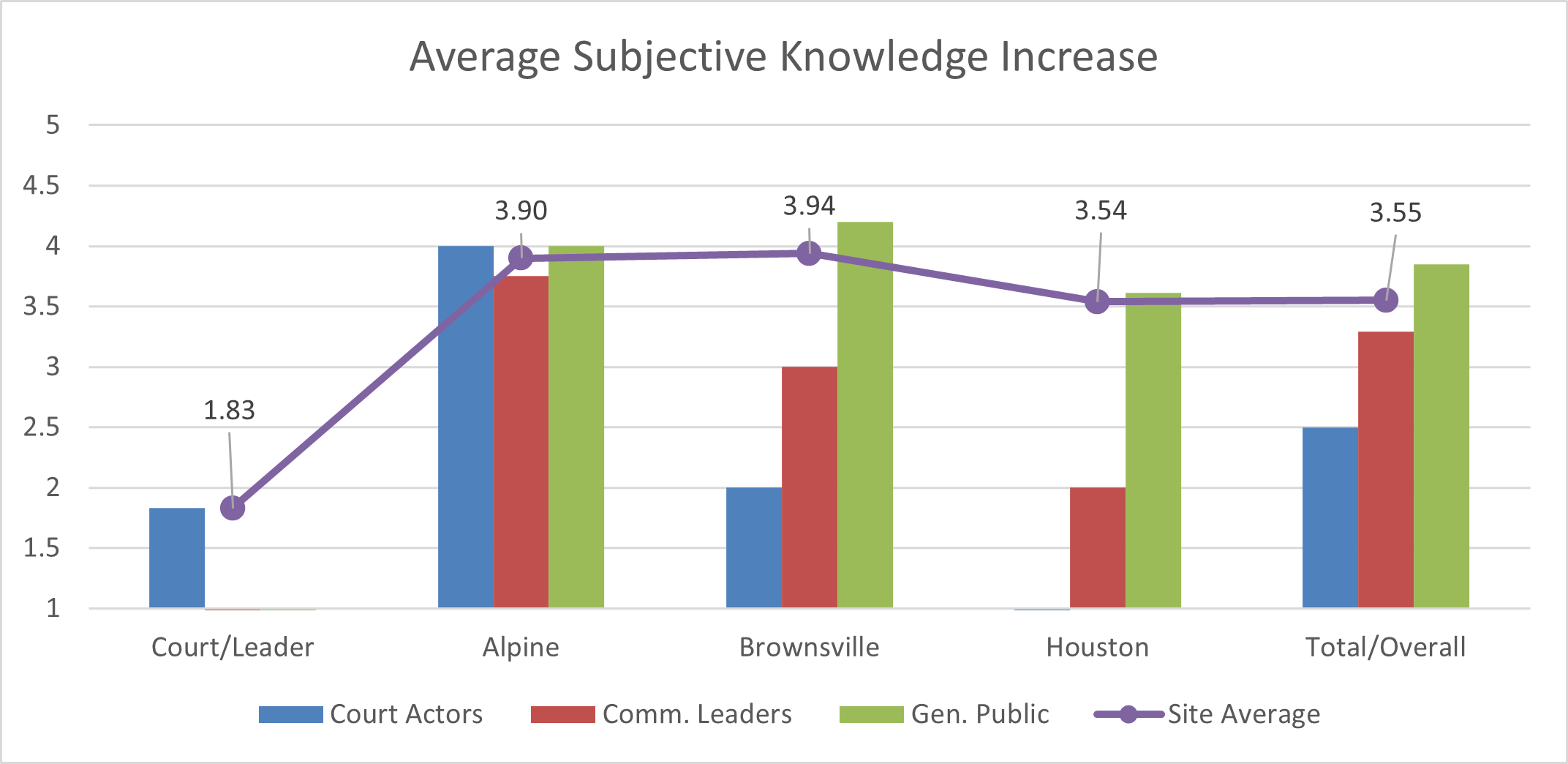
Across all four engagement sessions, the average rating for respondents’ perceptions of how important they thought the topics of discussion were was 4.4 a scale of 1-5, in which 1 = not at all, 2 = slightly, 3 = somewhat, 4 = very, and 5 = extremely, important.
Thus, respondents overall felt the topics of discussion were very to extremely important.
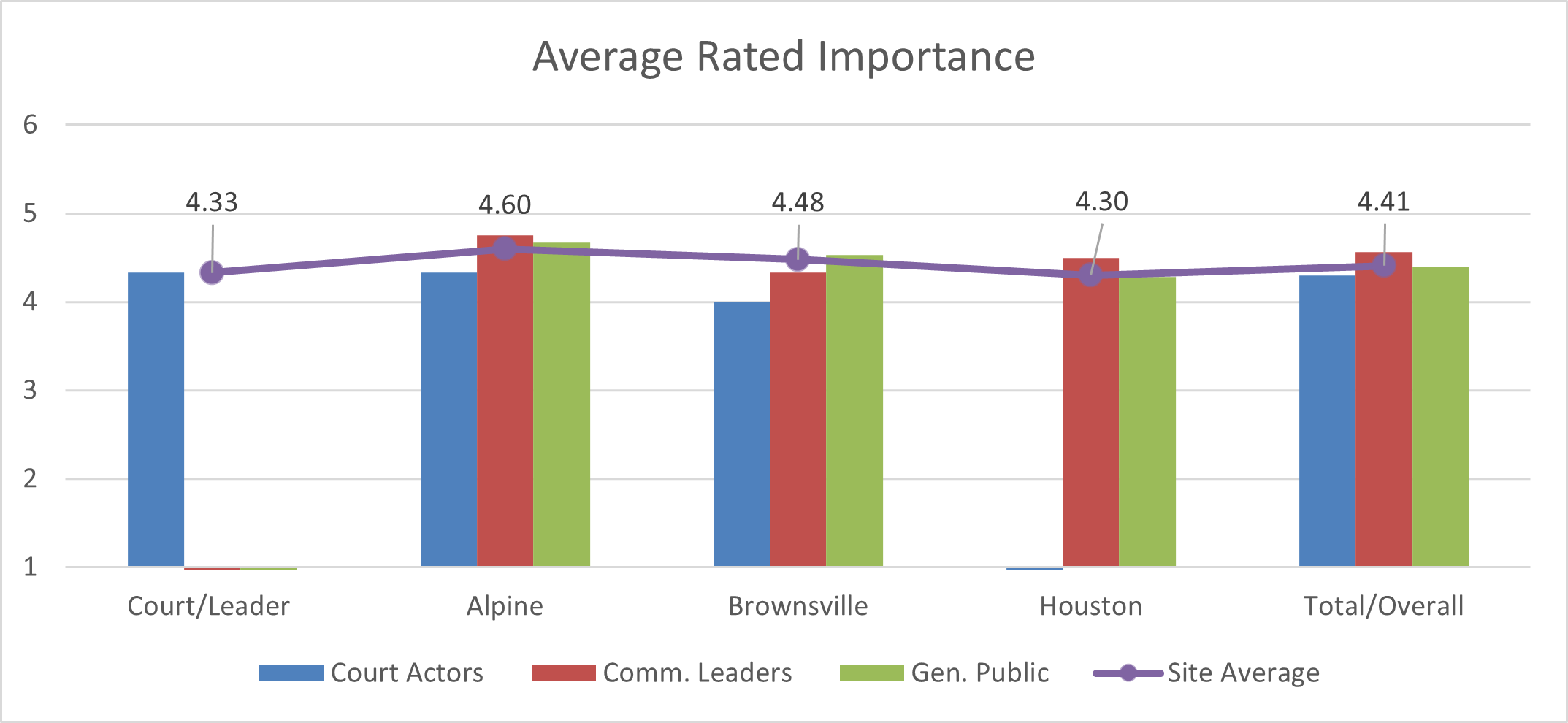
Across all four engagement sessions, the average rating for respondents’ perceptions of how helpful they thought the engagement experience was in making progress towards solving problems was 4.1 on a scale of 1-5, in which 1 = not at all, 2 = slightly, 3 = somewhat, 4 = very, and 5 = extremely, helpful.
Thus, overall, the engagement participants thought the experience was very to extremely helpful in making progress towards solving problems discussed.
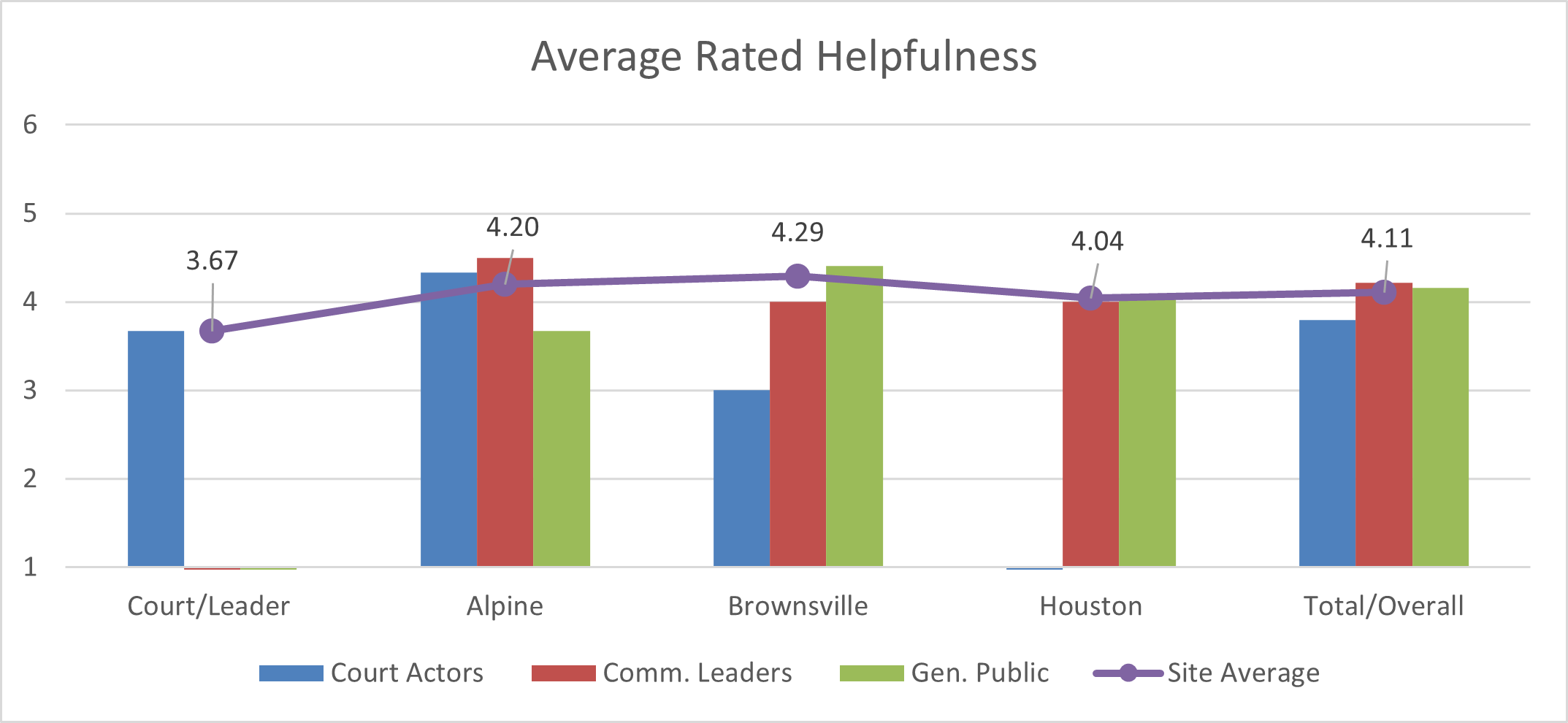
Participants at all engagement sessions were asked if they would or would not be willing to share a short survey about court issues with others or be contacted for more opinions about the topics of discussion in the future. Overall, 84% of respondents indicated they would be willing to share a survey with others, and 95% indicated they would be willing to be contacted in the future. Thus, a strong majority of respondents were open to further engagement about Texas courts after their participation in the initial engagement sessions.
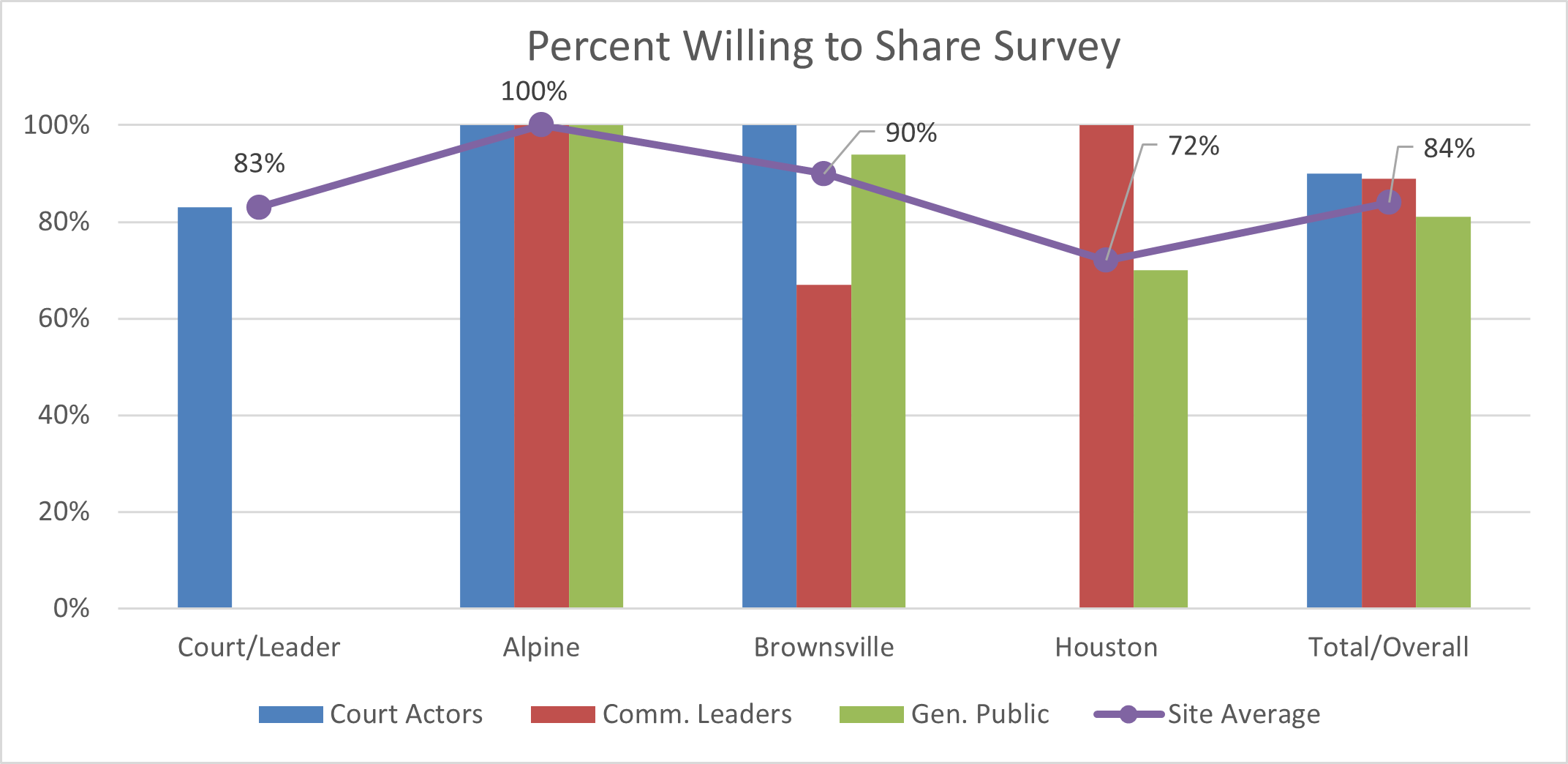
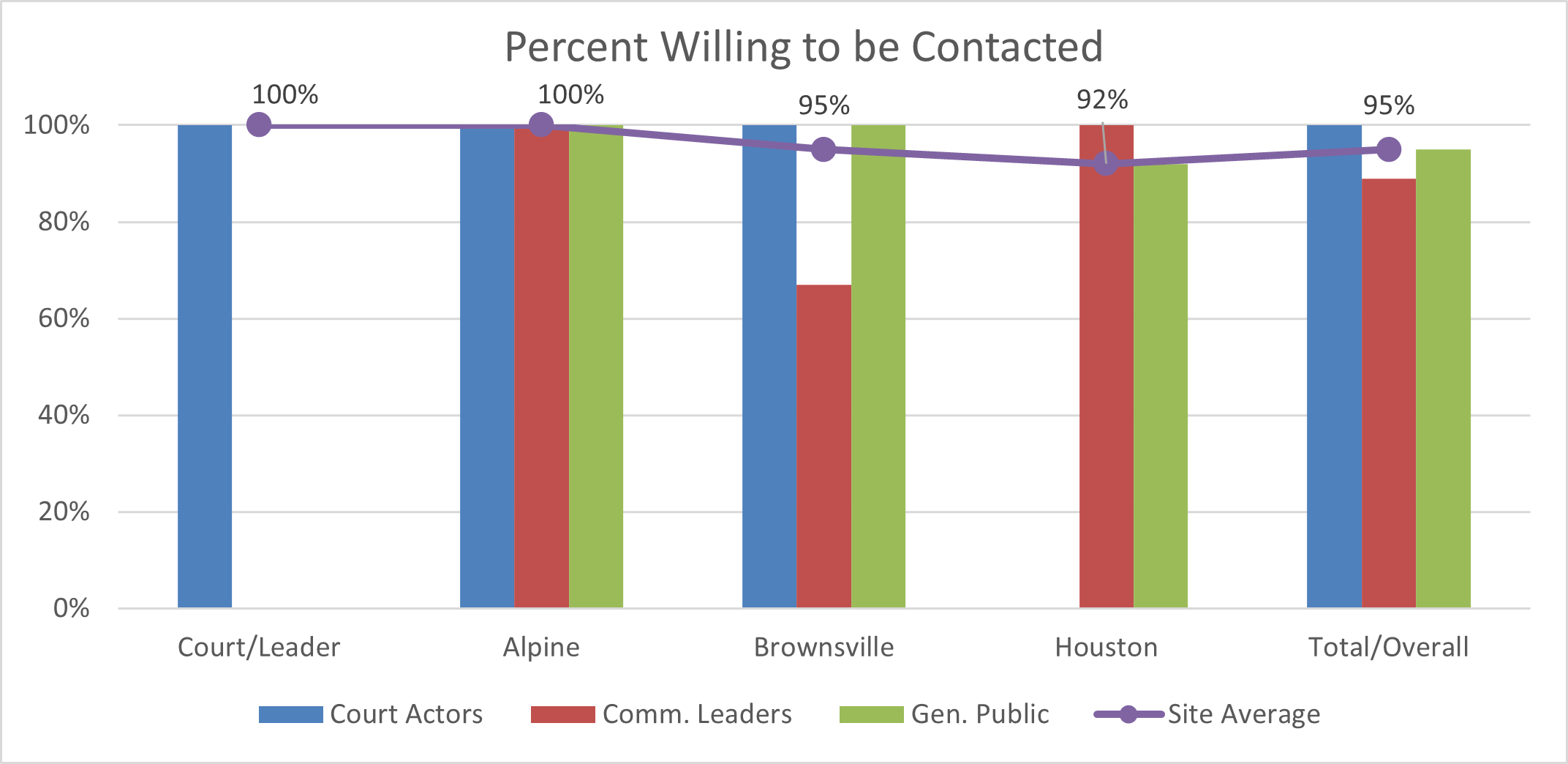
Sustainability
The Texas pilot project was based out of the Texas Office of Court Administration. The experiences and data gathered from the pilot project will inform future OCA initiatives. Identified follow-up activities are described below.
When completed, the Community Engagement in the State Courts Initiative report will be provided to all members of the public and court actors who participated in the engagement sessions.
Texas team members will continue to monitor the Texas Public Trust and Confidence Survey to inform further initiatives. Focus will be placed on attitudes related to the engagement topics - familiarity with the Texas court system, fairness, and equal treatment.
Texas team members will provide the final engagement report to the Texas Judicial Council. The Judicial Council examines the work of the courts and submits recommendations to the Legislature. The Texas Judicial Council has recommended further public engagement initiatives in the future.
Lessons Learned
Recruit from underrepresented communities: Focus should be placed on working with community groups and faith leaders to recruit people from underrepresented communities. Recruiting individuals spontaneously produced a good sample of community members, but resulted in less recruits because people did not have previous knowledge of the event.
Participants appreciate involvement of court actors: The presence of judges, district clerks, and other court actors brought an important element of trust to the engagement events.
Make time for dialogue: Participants and court actors enjoyed and benefited from discussion segments. Engagement sessions should have sufficient time for members of the public to ask questions and dialogue with court actors.




